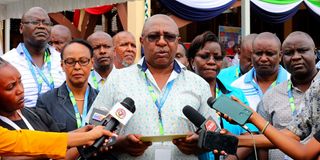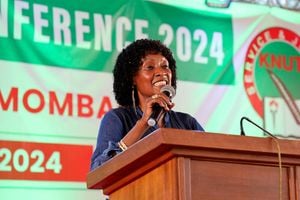
Kenya Secondary Schools Heads Association Chairperson Willy Kuria addresses the media in Mombasa on June 25, 2024
Principals of secondary schools have written to the Teachers Service Commission (TSC) to protest criteria for the promotion of teachers, terming it unfair to some teachers to shelve it.
Through the Kenya Secondary Schools Heads Association (Kessha), the principals have petitioned the commission and the National Assembly, arguing that the TSC's quota system for promoting teachers disadvantages regions with a higher number of qualified teachers.
The petition is regarding 19,943 promotional positions that the TSC advertised late last year and interviews conducted in January 2025.
“A quota-based system will lead to a situation where teachers in certain regions are at a clear disadvantage by unfairly reducing opportunities for qualified teachers from regions that have a higher number of competent and deserving candidates.
In turn, it unduly favours candidates from other regions with fewer qualified teachers, even if they have fewer years of experience and lower performance ratings,” reads the letter signed by Kessha chair Willy Kuria.
He told Nation that the association turned to the Education Committee of the National Assembly after failing to get a response from the TSC. He claimed that, in some regions, the TSC invited for interviews teachers who had not completed the mandatory six months in the same job group.
“We easily got the information from the county directors and when we complained and wrote to the TSC, they never disputed the information. This was mainly favouring ASAL areas,” Mr Kuria said.
Mr Kuria said that teachers who applied for promotion to Job Group Deputy D2 and below (deputy principal II – secondary school were neither shortlisted nor invited for the interviews despite having met the set requirements.
“Apparently, the foregoing happened in some regions while in others, that consideration of six months was made and the teachers were shortlisted. The upshot of that is that it will result and accord significant advantages to some regions while drastically disadvantaging others in what can correctly be surmised as marginalising some regions,’ Mr Kuria said.
He warned that unless checked, the trend could lead to some teachers stagnating in job groups on account of the geographical regions where they are posted to work.
“A promotional interview should prioritise merit, experience, and individual achievement. The imposition of a regional quota system undermines these principles by promoting teachers based on their geographical position,” the petition further reads.
Mr Kuria challenged the commission to find alternative methods to promote inclusivity and diversity.
“We urge the TSC to clearly communicate the criteria and qualifications expected and adhere to it to avoid giving a false sense of hope to the applicants,” he said.
Promotion of teachers has been a challenge for the commission due to budgetary constraints. This has seen many teachers stagnating in the same job groups for long.
Recently, the Kenya Union of Post-Primary Education Teachers (Kuppet) demanded that TSC publish a list of all teachers who are eligible for promotion in the 2024 – 2025 cycle.
Further, the union called for fair distribution of promotion vacancies across the country. According to the union, the TSC allocated vacancies equally among the 47 counties, regardless of disparities in the number of teachers in each region.
“Given the disparities in staffing levels across the country, such distribution is inherently flawed and unfair to many teachers.
A county that has over 11,000 teachers has been allocated the same number of vacancies as another with just 1,000 teachers.
The clear implication is that a teacher in the smaller county is 10 times more likely to get promoted compared to his or her counterpart in the more populous county,” said Kuppet acting secretary-general Moses Nthurima.









